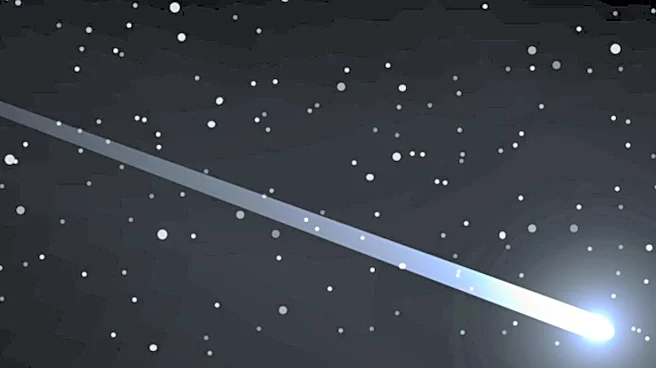What's Happening?
Michigan residents are set to witness a series of meteor showers throughout October, with the Draconids, Orionids, Southern Taurids, and Northern Taurids lighting up the night sky. The Draconids, known for their weak activity in recent years, began on October 6 and will peak on October 8. The Orionids, recognized for their fast and bright meteors, will be active until November 12, peaking on October 22-23. The Southern Taurids, active since September 10, will peak on November 3-4, while the Northern Taurids will peak on November 8-9. These meteor showers are best viewed from dark sky areas, with Michigan offering several state parks and international dark sky parks for optimal viewing.
Why It's Important?
Meteor showers provide a unique opportunity for astronomical observation and public engagement with science. The visibility of these celestial events can inspire interest in astronomy and science education. For Michigan, the presence of multiple dark sky parks enhances tourism and local economic activity as enthusiasts travel to witness these natural phenomena. The showers also offer a chance for scientific study, as they involve debris from comets and asteroids, contributing to our understanding of the solar system. The events can also foster community gatherings and educational programs, promoting awareness of natural sciences.
What's Next?
Following the October meteor showers, the Leonids will be active from November 3 to December 2, peaking on November 16-17. This continuation of celestial events provides further opportunities for observation and study. Local communities and educational institutions may organize viewing events and workshops to capitalize on public interest. Additionally, the presence of a newly discovered comet, C/2025 R2 (SWAN), although difficult to view from Michigan, adds to the excitement of astronomical phenomena during this period.
Beyond the Headlines
Meteor showers like the Draconids and Orionids highlight the importance of preserving dark sky areas, which are increasingly threatened by light pollution. Efforts to maintain these areas not only benefit astronomical observations but also protect ecosystems and biodiversity. The cultural significance of meteor showers, often associated with myths and folklore, can also be explored, enriching the public's appreciation of these events. Furthermore, the study of meteors and their origins can provide insights into the history and evolution of the solar system, offering a broader perspective on Earth's place in the universe.









